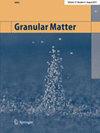Macro- and micro-mechanical behavior of CSU-LRS-1 lunar soil simulant under true triaxial loading path
Abstract
In this paper, a series of true triaxial tests with different intermediate principal stress ratios are conducted on both the lunar soil simulant and the sandy soils on earth using the discrete element method. An advanced discrete element servomechanism based on polyhedral specimen configuration is implemented such that true triaxial loading paths can be implemented under low confining pressure without introducing severe stress concentration. The high frictional angle and apparent cohesion of the lunar simulant are captured by employing a highly efficient contact model that fuses rolling resistance and van der Waals forces. The employed micro-scale parameters are calibrated based on the triaxial test results of the CSU-LRS-1 lunar soil simulant. The simulation results show that the lunar soil simulant exhibits lower shear strength with an increasing intermediate principal stress ratio. Generally, although the lunar soil simulant has a greater void ratio than that of sandy soils, the former exhibits significantly stronger shear-induced dilatancy and higher shear strength. The evolution of the load-bearing structure is quantified through a contact-normal-based fabric tensor. The interplay between internal structure evolution and external loadings can well explain the difference in mechanical behavior between lunar soil simulant and sandy soils on earth.



 求助内容:
求助内容: 应助结果提醒方式:
应助结果提醒方式:


